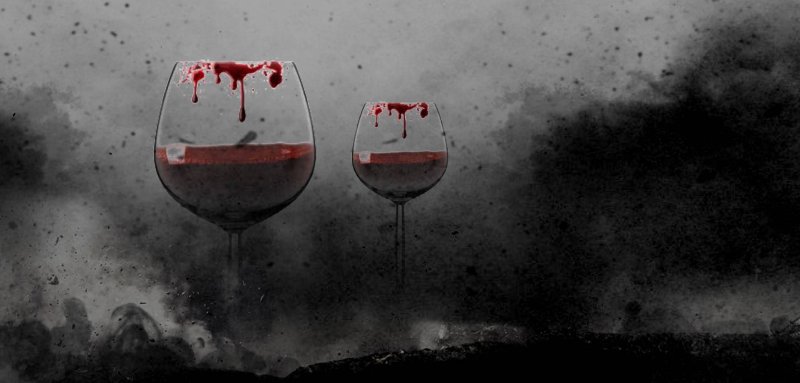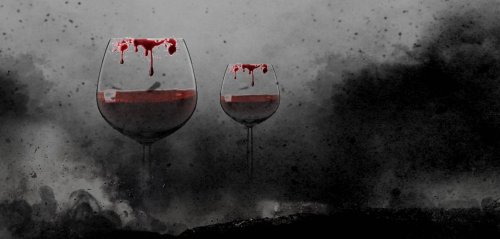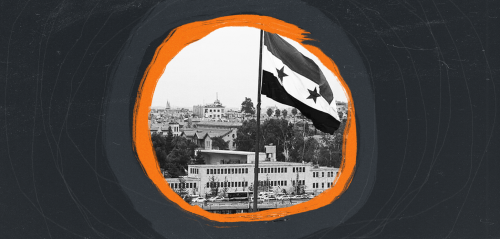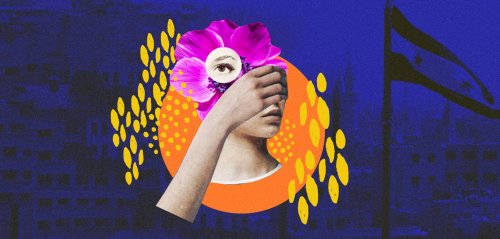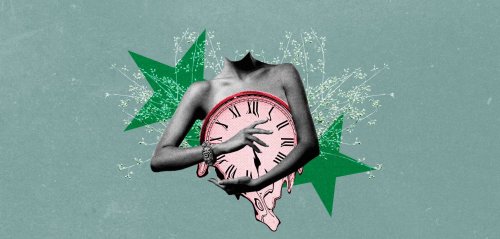After days of endless tears, I decide to steal some joy. I put on a red dress and head to the Museum of the Future in Dubai, which is filled with decorative light, happy children munching on grilled corn, and various other forms of entertainment. I watch as Santa Claus carries a little girl, who is crying because she lost a game, and I wish I could be Santa Claus, carrying all the frightened and sad children of war, ravaged by hunger and loss, those children who are not fortunate enough to toss and turn in a warm bed, awaiting the joy of Christmas and new clothes.
I watch these pampered children write their wish lists for the new year, while our children, their wishes devoid of gifts and Christmas lights, only wish to go to sleep with a full stomach, safe and warm, with certainty that they will wake up in the morning to find their families smiling, their mothers preparing tea and zaatar rolls with bread fresh out of the oven, their fathers putting on their keffiyehs and getting ready for work, even though it's Christmas morning!
So that my mother doesn't cry, I show her my new clothes and the little house I decorated with cream, even though I'd rather live a lifetime by candlelight and eat the most delicious 'Riz bi Haleeb' in the world, just because she is the one who made it
Seizing joy as resistance
This is not the first year I've seen Santa Claus unable to find his way among destroyed and ruined homes, and it looks like it won't be the last. Yet nonetheless, I decorated my tree the way I used to in Syria.
I believe that our attempts to seize joy are a different kind of resistance. Each year, I put up my tree through tears, before putting on a smile and hanging my sorrows and decorations on my tree. I then pour a glass, raise it high, and make a toast: A toast to the joy that we will snatch, in spite of all the wars, just as they snatch our hearts from us, a toast to our freedom, our dignity, and whoever is left of our families and friends!
How do I tell my friends, who have never been to Syria or Palestine, that war has made me try to find joy even in the darkest moments, because I know that it might not come again?
In Dubai, the city of light and endless electricity, I fulfilled a thirteen-year long dream born in Syria: I bought a Christmas tree, and its lights will never dim due to any power cuts or electric bills. I turned on the tree lights, and uploaded a photograph of it across my social media accounts – happier than a child tasting ice cream for the first time. However, I only keep it lit for a few hours each day, out of habit and guilt. My sister has yet to see her tree lit up this year, as her electricity cuts before she returns from school, and only comes back on after she has fallen asleep. Whenever I think about this, I turn the lights off my tree, before turning them back on a few hours later to console myself.
With each day that passes, explaining this to the world becomes harder. How do I tell my friends, who have never been to Syria or Palestine, that war has made me try to find joy even in the darkest moments, because I know that it might not come again? How do I convey that these short moments of happiness don't erase a lifetime of fatigue, fear, and sadness? Do I have to open my heart each time and let them see the hell that lies within, or should I pretend that I don't care what anyone thinks? It doesn't matter, because they also don't care about what I've been through until they see my shining tree!
Meeting loved ones and a gift behind the door
While the firewood crackles as it burns in the fireplace, and the heart of the chestnut separates from its shell, preparing itself to be eaten by all of us, as we watch Fairouz on the television, singing "Laylet Eid... Laylet Eid." I am grown now, and so too is my mind, but that hasn’t changed the fact that my father’s warm kiss reminds me that I'm not alone. My family were 'the loved ones', and even when the chestnut became a dream and the gifts became fewer, we still gathered behind the door every Christmas to sing, laugh, drink local Arak and wine, and wish each other better years, without a tree, or lights, or decorations!
Today, I call my mother, and she tells me that she's happy because I will finally be able to watch the fireworks in Dubai and eat ice cream in the winter. So that she does not cry, I show her my new clothes and the little house I decorated with cream, even though I'd rather live a lifetime by candlelight and eat the most delicious 'Riz bi Haleeb' in the world, just because she is the one who made it. I say this to my sister, and she tells me that I should fall in love.
I pour a glass, raise it high and make a toast: A toast to the joy that we will snatch in spite of all the wars, just as wars snatch our hearts from us – a toast to our freedom, our dignity, and whoever is left of our families and friends
It's that simple: love can save us from being far from home in a way I didn't expect. But when I fell in love, love made me soft like a sweet potato, soft and ready to be mashed by loneliness, quietly and patiently like coal on the fire. I then learned to lower my expectations of love. I don't want gifts or hot kisses. I don't want sweet words of flirtation or my loved one saying he is with me: I know it's not true. I want a warm hug and a kiss on my forehead to feel for a moment that someone like my father might be close enough and finally make me cry.
We have become the countries we left
Last year, I wrote a report about Damascus welcoming its Christmas without lights. I was surprised by the possibility of an entire country ignoring all its ruin, devastation, open wounds, and its roads scarred with pain, and just moving on to hang decorations and carry on with life. I remember it now as my thoughts accompany me, with Mayada Bseliss singing “I never imagined you'd come back to me, like someone who hasn't heard of pain or hunger.”
Syria gave me reason to try my best until I became worthy of leaving, and this worked, allowing me to escape. And now, I laugh with a full mouth, not for anything but to escape myself. I have become the country that so terrified me, with one slight difference, as I don't have borders to fly across. And slight differences, if you didn’t already know... are deadly.
* The views and opinions expressed in this article are those of the author’s and do not necessarily reflect the official policy or position of Raseef22
Raseef22 is a not for profit entity. Our focus is on quality journalism. Every contribution to the NasRaseef membership goes directly towards journalism production. We stand independent, not accepting corporate sponsorships, sponsored content or political funding.
Support our mission to keep Raseef22 available to all readers by clicking here!
Interested in writing with us? Check our pitch process here!
